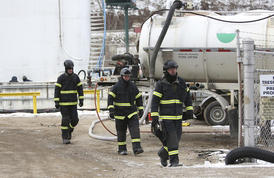
Members of the FBI Hazardous Materials Response Unit visited Freedom’s Barlow Drive facility to figure out how and when the leak happened. U.S. Attorney Booth Goodwin was on site with investigators in temperatures that hovered around 5 degrees.
By Whitney Burdette
Charleston Daily Mail
CHARLESTON, W.Va. — Legislation that will regulate aboveground storage tanks is on its way to becoming law.
Senate Bill 373 passed the West Virginia Senate unanimously Tuesday. The legislation requires owners or operators of aboveground storage tanks — similar to those owned by Freedom Industries and other companies throughout the state –to register those tanks with the state and submit to yearly inspections.
Tank owners must also disclose the size of their tanks, the types of liquids those tanks hold, location of the tank and proximity to water. Engineers or other certified inspectors may scrutinize the tanks, but the state Department of Environmental Protection also will inspect tanks that are within 25 miles of a water intake.
Additionally, water providers would need to have contingency plans in place to prevent contamination or notify the public if contamination occurs and identify alternative water sources. They would need to submit source water protection plans to the Bureau for Public Health by July 1, 2015.
About a dozen senators stood Tuesday to speak in support of the bill, including Sen. Erik Wells, D-Kanawha, who said the incident could have been worse for customers of West Virginia American Water.
“This is an issue that will have national implications,” he said. “We were lucky in some respects. The chemical had an odor. Imagine if it did not have an odor. It could have been weeks before we realized what was taking place.”
The chemical, Crude MCHM, has a licorice-like odor. Many people are still complaining, nearly three weeks later, of their tap water bearing the smell and refuse to drink it. Wells said the University of Pittsburgh hockey team, who visited South Charleston last weekend to play West Virginia University, were told to bring their own water. Wells said he fears other groups or organizations traveling to the area may be discouraged.
“We’re now tarnished to a degree,” he said. “There is a perception out there the water in West Virginia is not safe to drink…”





